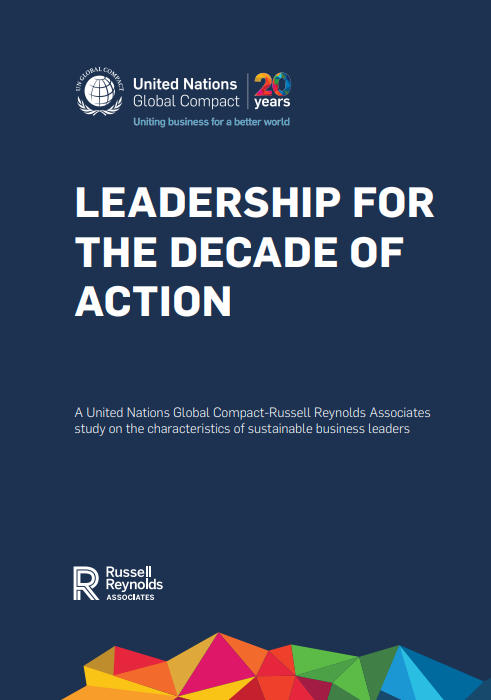Explores the qualities and actions necessary for sustainable leadership within the United Nations’ Sustainable Development Goals (SDGs) framework and the UN Global Compact’s initiative to inspire private sector action. Significantly, it underscores the role of business leaders in tackling global issues like climate change, poverty, and inequality. The report also emphasizes the growing demand for transformational business leaders who can see beyond immediate profits and acknowledge their role as catalysts for change within their organizations and larger ecosystems.
In addition, the report highlights four vital skills for sustainable leaders: multi-level systems thinking, stakeholder inclusion, disruptive innovation, and long-term activation. Importantly, it underscores the significance of a sustainable mindset and stresses organizations need to incorporate sustainability into their leadership teams. The study on sustainable business leaders highlighted several key findings:
- Motivations and Journeys of Sustainable Leaders: The study categorized sustainable leaders into three groups based on their motivations and journeys: Born Believers, Convinced, and Awoken. These leaders have a passion for sustainability, understand its strategic importance, or have had a pivotal realization moment.
- Current State of Sustainability in Leadership Selection: While sustainability is increasingly mentioned in role specifications, it is not yet required in executive and non-executive appointments. Only 4% of role specifications in 2019 made sustainability experience or mindset an actual requirement.
Overview
A New Level Of Ambition Is Needed
Underscores the evolving expectations of commercial organizations and their leaders, notably in response to changing societal values, climate concerns, and economic instabilities. Crucially, stakeholders such as customers, employees, investors, and suppliers actively challenge companies to prioritize sustainability, stakeholder engagement, and resource efficiency.
Notably, the section highlights that successful businesses will meet the needs of a wide range of stakeholders, minimize resource usage, and demonstrate responsiveness to societal concerns. It mentions that CEOs recognize the critical importance of sustainability and trust for competitiveness in the next five years, as a United Nations Global Compact analysis indicates.
Furthermore, the COVID-19 pandemic has further underscored the weaknesses in the global system, thereby emphasizing the urgent need for a new type of business leadership that prioritizes sustainability, resilience, and inclusivity. Consequently, this section sets the stage for the imperative for organizations to adopt a new level of ambition in their approach to leadership, sustainability, and stakeholder engagement to thrive in a rapidly changing world.
The Rhetoric-Reality Gap
Delves into the noticeable discrepancy between CEOs’ commitment to sustainability and implementing sustainable practices within organizations. Notably, while 92% of CEOs acknowledge the importance of integrating sustainability for future business success, surprisingly, only 48% claim to actively implement sustainability initiatives. Moreover, the section highlights that a mere 21% of CEOs believe businesses play a critical role in achieving the Sustainable Development Goals (SDGs). This stark gap between rhetoric and reality underscores the pressing need for organizations to bridge the divide between intention and action regarding sustainability.
Finally, the section emphasizes the importance of moving beyond mere declarations of commitment to sustainability. It strongly calls for concrete steps to embed sustainable practices into business operations. It also urges a shift towards genuine implementation of sustainability initiatives to address the pressing environmental and social challenges businesses and society face.
A New Model For Leadership
Highlights the importance of studying successful sustainability leaders to understand the key attributes and actions contributing to their effectiveness in integrating sustainability into business strategies. From these insights, organizations can effectively guide their processes in selecting, promoting, and developing leaders capable of driving sustainable practices. Ultimately, these leaders can significantly positively impact societal and environmental factors.
Key points from this section include:
- The study group comprises global leaders with diverse industry experience, primarily in EMEA, North America, Asia-Pacific, and Latin America.
- 34% of the participants in the study were female, reflecting a diverse representation.
- Analyzing these sustainability pioneers provides unique insights into the qualities and actions required to be a sustainable leader, essential for driving the necessary business transformation in the current decade.
The Path Forward: Embedding Sustainability Into Your Leadership Culture
Stresses the crucial role of CEOs and board members in incorporating sustainability into business strategies and operations. It further highlights the necessity of embedding sustainability within an organization’s leadership culture for long-term success. Hence, the section emphasizes aligning leadership culture with sustainability goals. Moreover, it provides practical steps for integrating sustainability into leadership frameworks, ensuring sustainability becomes a critical element of decision-making and strategic planning.
Key points from this section include:
- Organizations must develop a sustainable mindset and four critical leadership attributes (multi-level systems thinking, stakeholder inclusion, disruptive innovation, and long-term activation) as prerequisites for senior leadership roles.
- While a sustainability mindset and understanding are required in only 4% of executive and non-executive appointments, organizations can shift their leadership profiles to prioritize sustainability.
- The best organizations take deliberate steps to embed sustainability into leadership frameworks, including selection, promotion, rewards, and development processes.
- To set companies up for success, the section provides recommendations for integrating sustainability into selection, succession, reward, and development practices, emphasizing the importance of making sustainability a core focus of leadership development.
Conclusion: Sustainable Leadership = Future Success
Insists that sustainable leadership is not just important but crucial for future success. It makes a solid call to action for organizations to prioritize sustainability, cultivate leaders, and embed sustainability into their core business strategies. The section firmly insists that sustainability isn’t a topic for future consideration but rather an urgent discussion for today, required to drive change and ensure long-term viability and success.
Key points from this section include:
- The sustainability pioneers studied in the report have demonstrated the synergy between successful business practices and sustainability, recognizing that sustainability is an ongoing journey rather than a destination.
- Expectations of CEOs, executives, and board members are evolving, with sustainability being identified as a leadership imperative for long-term success.
- The section stresses that sustainability must be integrated into the fabric of organizations, starting from the top leadership and permeating all levels of the organization.
- It calls for organizations to embed sustainability into their leadership frameworks and processes, fostering sustainable leaders at all levels to address the systemic challenges faced by the world today.
To make sustainability core to the DNA of leadership teams, organizations can take the following steps:
- Embedding Sustainability in Leadership Culture: CEOs and board members need to embed sustainability in the leadership culture of their organizations. This involves developing a sustainable mindset and critical leadership attributes as prerequisites for senior leadership roles.
- Selection, Succession, Reward, and Development: Organizations should ensure that sustainable leadership potential and track record are vital to selecting senior leaders. Sustainability should be integrated into succession planning, incentives, and remuneration of board members, CEOs, and executives. A sustainable mindset and leadership attributes should also be a core focus of leadership development and experiences.
SDG Implementation Framework
Presents a comprehensive roadmap for integrating the Sustainable Development Goals (SDGs) more deeply into business strategy and operations, forming a fundamental component of the SDG Ambition initiative by the UN Global Compact. This initiative challenges and supports companies to approach the 2030 Agenda more strategically and creatively. The SDG Implementation Framework, in turn, provides a structured method for companies to align their strategies with the SDGs. This approach encourages businesses to incorporate sustainability principles into their operations and interact with stakeholders to create a positive impact and support the global sustainability agenda.
Key points from this section include:
- The framework focuses on personal leadership and the role of CEOs, board members, and executives in driving the necessary business transformation for the Decade of Action.
- It guides how companies can integrate the Ten Principles and SDGs into their operations, including governance, people management, sales and marketing, corporate strategy, finance, partnerships, stakeholder relations, products and services, reporting, and corporate communications.
- The framework emphasizes the importance of anchoring ambition in strategy and governance, deepening integration across operations, and enhancing stakeholder engagement to drive meaningful progress towards the SDGs.




